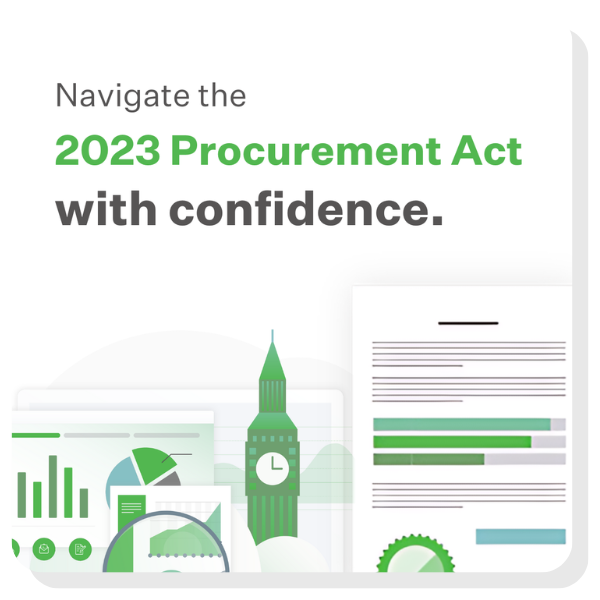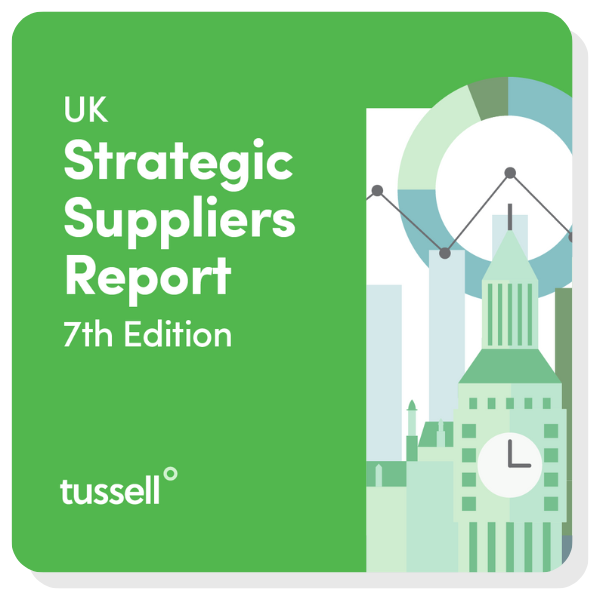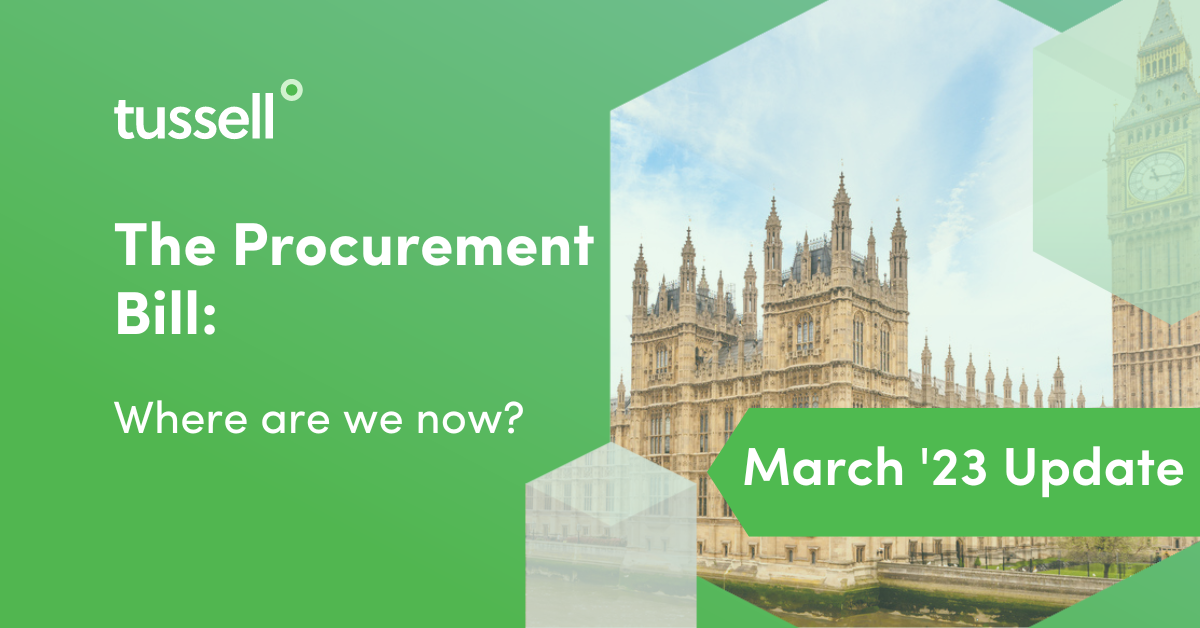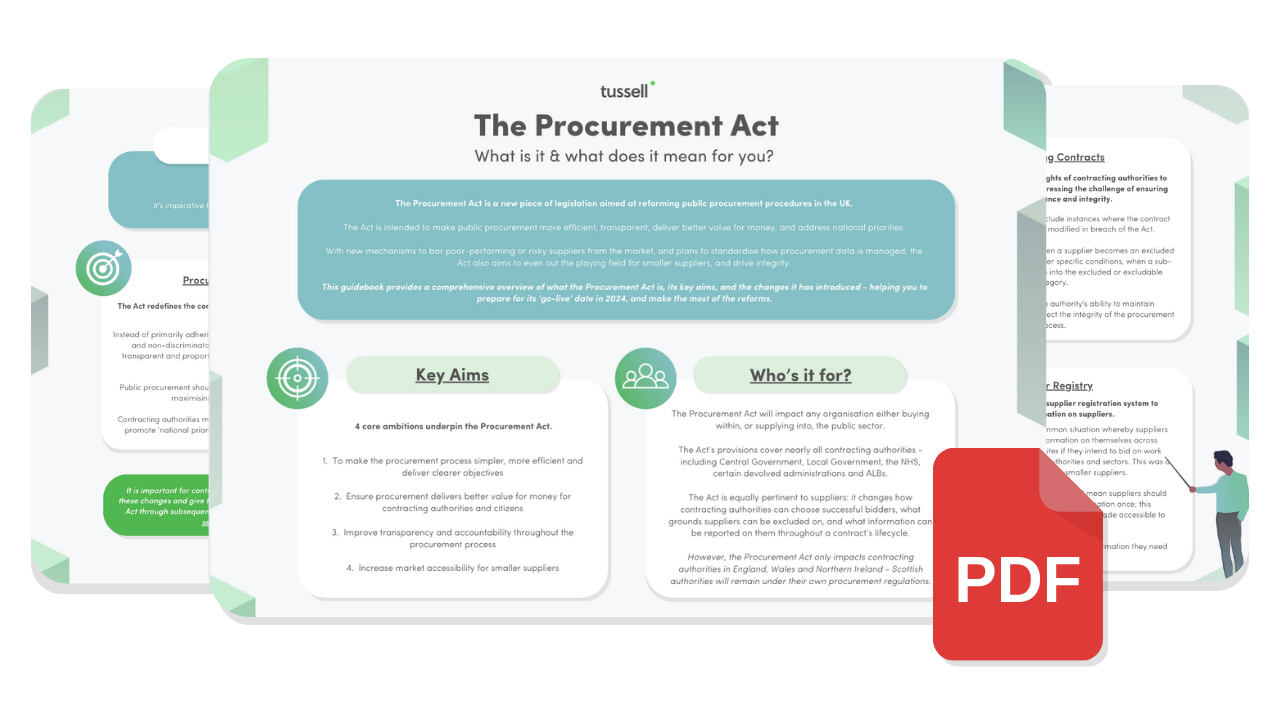Update: to get Procurement Act-ready, head to Tussell's Procurement Act Hub to access all our latest explainers, resources & more.
The Procurement Bill has steadily been progressing through Parliament since our last update on the Bill in November 2022. Having started in the House of Lords in May 2022 with 124 clauses, over 13 parts and 11 schedules, it has now completed its journey through the House of Lords and arrived in the House of Commons for the Report Stage.
The legislative process in the UK is lengthy, with many substages and debates. This Bill started in the House of Lords, where it went through 2 Reading Stages, then the Committee Stage and then the Report Stage before the 3rd and Final Reading. Now having arrived in the House of Commons, it will go through the same process as it has just finished in the House of Lords. When this is completed the final stages will consider the amendments before getting Royal Assent.
In this blog, we've taken a look at what amendments were made to the Procurement Bill during the Second Reading & Committee Stages in the House of Lords, and what they mean in practice for you.
Jump ahead to read about:
- What is the Procurement Bill?
- What happened in the House of Lords?
- Where are we now and what happens next?
***
This article is part of a series of articles on the 2023 Procurement Act.
Head to Tussell's Procurement Act Hub for all the information and resources you need to get Procurement Act ready.
What is the Procurement Bill?
The Procurement Bill aims to simplify and modernise procurement rules and procedures for public authorities purchasing goods, services, and public works from the private sector.
The government sees this as an opportunity to tailor the procurement process to the country's needs, creating more opportunities for innovation and supporting new businesses. The Bill will repeal current EU law-based procurement regulations and lay out new rules and procedures for selecting suppliers and awarding contracts. The Bill has 124 clauses and 11 schedules and contains regulation-making powers.
The Bill focuses on improvements in four areas:
1️⃣ Reform of the procurement process and legislation to increase speed and simplify it
2️⃣ Make procurement and the process better value for money
3️⃣ Improve public benefit through an increase in transparency and accountability
4️⃣ Benefits for SMEs through innovation, including a new digital infrastructure
Overall the Bill has been created based on principles of transparency, non-discrimination, value for money, public benefit and accountability.
You can read a summary of the key points of the Procurement Bill and what is means for you in our previous blog, "The Procurement Bill: what it means for you".
What happened in the House of Lords?
The Second Reading
The Second reading is a stage in the process of passing a bill where members of the House of Lords debate the main principles and purpose of the Bill and can suggest amendments. Before the debate, members add their name to a speakers list. During the debate, any member can speak, indicating their interest in the Bill and potential involvement in suggesting changes later. Second Reading debates typically last a few hours or sometimes a couple of days.
Members of the House of Lords generally welcomed the Procurement Bill, although Labour and Liberal Democrat members noted that it fell short of the Transforming Public Procurement Green Paper's suggestions in some areas, such as transparency and social value. They also argued that the Bill did not define key procurement principles and lacked specific requirements regarding climate objectives. Some Conservative members also emphasised the need for simple, effective rules and cautioned against increasing requirements that could create administrative burdens. The debate covered topics such as health service procurement, defence procurement, support for SMEs, ethical procurement, and modern slavery.
Baroness Hayman (Labour) stated that the Opposition supports the Government's goal of streamlining and simplifying procurement processes, particularly the change from awarding contracts based on the most economically advantageous tender (MEAT) to the most advantageous tender (MAT). Labour also supported improving the access of SMEs and social enterprises to government contracts.
The Labour Party also expressed support for several proposals in the Green Paper that were not explicitly included in the Bill, such as environmental and climate change objectives, sustainable procurement, social value in procurement, and a digital single suppliers' portal based on a "tell us once" principle.
In the end, there was a cross-party consensus that certain procurement principles and objectives should be explicitly reflected in the Bill’s text.
SME & local procurement:
Members from across the House expressed support for providing more opportunities for small and local businesses through procurement. Lord Mendelsohn (Labour) and Lord Aberdare (Crossbench) urged support for SMEs by synchronising prompt payment rules across the Procurement Bill and other legislation. The Labour Party and Liberal Democrats cautioned that private enforcement, with litigation costs as a barrier for SMEs seeking legal protection, should not be the only means of enforcement. Lord Thomas (Crossbench) emphasized the importance of recognising the relationship between subsidy control rules, their use to develop local economies and procurement.
Utilities procurement:
Members debated whether private utilities should be included in the Bill's remit and be required to follow procurement rules when buying goods or services. Some members, including Conservative and Labour peers, argued that this would place an unnecessary burden on private utilities beyond what is currently required under EU law-based utility procurement regimes. However, it was noted that the government has the power to amend the Act through regulation to reduce the regulation of private utility procurement.
Social value:
Baroness Thornton (Labour) pointed out that there has been a consensus over the last decade, across the political spectrum and among business groups, about the significance of social value in procurement. However, the Bill as introduced does not explicitly use the words "social value", but rather just alludes to this concept.
Climate & environmental aims:
Cross-party amendments were proposed to allow authorities to reward suppliers who demonstrated potential for innovation and offered climate-positive and nature-positive sustainable products. Others proposed that contract award criteria would always be aligned with specific environmental and climate change objectives. However, the government argued that such requirements were already in place for major government contracts.
Exclusion grounds:
Clauses 54-61 of the Procurement Bill cover the exclusion of suppliers who are deemed unsuitable, based on mandatory or discretionary grounds outlined in Schedules 6 and 7. These clauses also allow Ministers to make a decision to bar individual suppliers from accessing the procurement regime entirely through a debarment regime.
In the Grand Committee, there was a debate on Labour's amendments to exclude suppliers who do not disclose their tax payments or have links to tax havens. The government argued that the Bill's scope already includes tax compliance and that transparency requirements would be unprecedented, requiring suppliers to disclose their beneficial owners. However, Lord Hunt (Labour) noted that there was a fundamental disagreement between the government and the Labour Party on whether procurement legislation could be used to enhance other policies.
House of Lords Amendments (Committee Stage)
The Committee Stage involves a detailed examination of the clauses and schedules of a bill, with any member of the House of Lords able to take part. It usually starts about two weeks after the Second Reading and can last up to eight days or longer. Before the Committee Stage, amendments are gathered and published in a marshalled list. During the Committee Stage, every clause of the bill is considered, and votes on any amendments can be taken. Members can discuss an issue for as long as they want, and the government cannot restrict the topics or impose a time limit (this is different from the procedure in the House of Commons)
The House of Lords report stage happened on the 28th and 30th November 2022.
Key debate themes:
Debate in the House of Lords also covered issues such as supporting local suppliers and social enterprises, addressing conflict of interest, and auditing Ministry of Defence procurement spending.
Addressing conflict of interest was at the root of several of debates.
The Procurement Bill aims to increase transparency and fight corruption, including measures to expand on procurement information being reported and establish a register for suppliers. This is in response to lessons learned during the Covid-19 pandemic. The government is seeking to create a fully transparent public procurement system by introducing new procurement notices and a "Tell Us Once" system for suppliers. Alongside this, the Bill currently includes the creation of a central digital platform with API access to data published to the Open Contracting Data Standard, which could be supplemented with registers and tools for analysis and integration of commercial data. This reform would contribute to lowering prices, improving accountability, reducing corruption, and saving businesses money. The Bill also proposes a duty on contracting authorities to share procurement information and act with integrity which is outlined in Clauses 80-82. Additionally, Amendment 72, as aforementioned, addressed the issue of 'VIP' lines.
An amendment to audit the spending of the Ministry of Defence was tabled by the Labour Party as historically the MoD has awarded a significant proportion of contracts without an open competition. However, the Labour Party withdrew this amendment following a debate.
A fundamental disagreement from the Labour Party that ran throughout the stage was that the Labour members believe that the government's focus on using procurement legislation to enhance policies beyond narrow procurement interests is misguided.
During the committee stage, members also debated amendments related to supporting the UK's climate and environmental objectives. There were concerns that public procurement lacked connection with the consideration of net-zero and government environmental goals. The language of the National Procurement Policy Statement (NPPS) was considered more modest than that of the Green Paper regarding climate change and meeting the UK's net-zero carbon targets by 2050.
Amendments:
The Grand Committee of the House of Lords considered over 500 amendments, including 350 government amendments, for the Procurement Bill. Most of the changes were technical and did not alter the Bill's policy intent.
The report stage saw 205 amendments proposed, of which 161 were agreed to, including government amendments clarifying definitions and introducing higher reporting thresholds.
The House of Lords passed five non-government amendments and debated a further amendment that was not passed. These amendments were:
-
Amendment 3: including the NHS in the definition of a public authority under the Procurement Bill - passed 196 to 183 votes ✅
-
Amendment 46: requiring the government to consider a set of principles including economic, social, environmental and public safety priorities, before publishing the National Procurement Policy Statement. Further principles will include value for money, transparency, fair treatment of suppliers and accountability - passed 163 to 162 votes ✅
-
Amendment 47: making legal requirements regarding climate change, environmental, public services, supplier innovation and abuse of public money strategic priorities in the National Procurement Policy Statement - passed 165 to 150 votes ✅
-
Amendment 72: creating 'VIP lanes' for future contracts that aimed to ensure there was no preferential treatment of suppliers connected to or recommended by members of either House - rejected 201 to 220 votes ❌
-
Amendment 91: introduction of a discretionary power to exclude suppliers from public contracts if they have been involved in forced organ harvesting or unethical activities related to human tissue - passed 191 to 169 votes ✅
-
Amendment 94: creating a timeline for the removal of physical technology or surveillance equipment from the government's procurement supply chain will be established if there is evidence that a provider has been involved in modern slavery, genocide, or crimes against humanity. This will ensure the removal of suppliers involved in such activities from the government's procurement supply chain - passed 178 to 158 votes ✅
Where are we now and what happens next?
The Bill is now at the Report Stage in the House of Commons. This stage allows all MPs to consider further amendments to the Bill which have been previously examined in the Committee Stage. All MPs may speak and vote on the amendments; new clauses can also be suggested.
As there is no set time period between the Committee Stage and the Report Stage, and debates may take place over several days, we are not sure when the Bill will progress to the next stage. After the report stage is complete, there is usually a debate on the Bill's third reading.
The Cabinet Office recently issued this update on the timeline of the Procurement Bill:
"Once the Bill receives Royal Assent - which we expect to be later this spring - work to finalise the secondary legislation (Statutory Instruments, or regulations) will take centre stage. This will include a public consultation on the draft regulations. More details of the timing of this consultation will be shared in due course.
Following the consultation, the final version of the secondary legislation will be laid in Parliament and we expect that this would be the earliest point we could give 6 months’ advance notice of go-live of the new regime; we expect go-live will be spring 2024 at the earliest."
As per our previous updates and summaries on the Procurement Bill, the Bill as it currently stands is not legally binding and has currently not created any changes in the UK's procurement process. Until then, the current regulations and case law on procurement processes remain. Alongside this, it is also important to remember that the Bill will only change public procurement in England, Wales and Northern Ireland. Scotland will remain under its own separate, but similar system.
*
To conclude, having been debated thoroughly in the House of Lord, some amendments were made to the Bill.
These amendments, however, did not fundamentally change the principles of the Procurement Bill, but rather - as legislative amendments tend to do - tightened some of the Bill's wording and concepts. It is hoped that this will make the Bill easier to interpret and implement when it's passed into law.
Looking forward, it is paramount to monitor the development and progression of the Bill and try to prepare in the best way possible.
Sign up to the Tussell newsletter to keep up to date with the Procurement Bill through our upcoming summaries, blogs and videos on this topic.
*
The Procurement Bill makes clear the importance of clear data when selling to the government - Tussell can help you with this. Book a personalised demo of the platform now to uncover the insights our data provides and how it can help you do more business with government.
This article is part of a series of articles on the 2023 Procurement Act.
Head to Tussell's Procurement Act Hub for all the information and resources you need to get Procurement Act ready.-1.png?width=450&height=330&name=Procurement%20Act%20Hub%20Graphics%20(1)-1.png)















